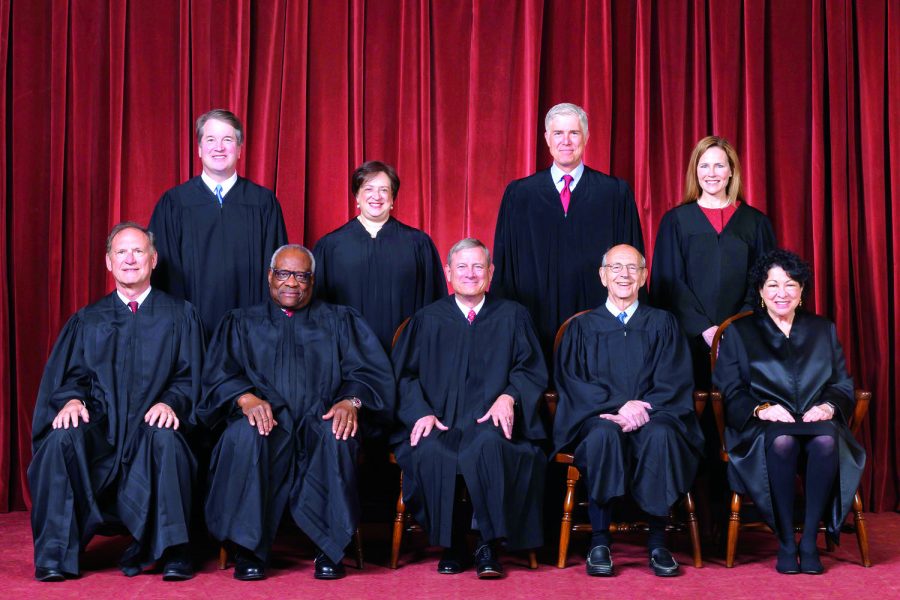New SCOTUS term underway
Fred Schilling, Collection of th
The Roberts Court, April 23, 2021 Seated from left to right: Justices Samuel A. Alito, Jr. and Clarence Thomas, Chief Justice John G. Roberts, Jr., and Justices Stephen G. Breyer and Sonia Sotomayor Standing from left to right: Justices Brett M. Kavanaugh, Elena Kagan, Neil M. Gorsuch, and Amy Coney Barrett. Photograph by Fred Schilling, Collection of the Supreme Court of the United States
November 10, 2022
The beginning of the Supreme Court’s term brings cases from all over the country to Washington D.C. On Oct. 3, the new Supreme Court term kicked off amid controversy over some of its recent decisions.
The Court’s approval ratings are at an all-time low after the decision in June to overturn Roe vs. Wade, the United States’ landmark abortion case. According to Pew Research Center, six in 10 Americans support legal abortion – the opposite of what the Supreme Court ruled.
Chief Justice John G. Roberts, Jr. has spoken out in defense of the court’s legitimacy. Roberts, who has served on the Supreme Court for 17 years, said the role of the court should not be questioned simply because citizens do not agree with its decisions.
However, Justice Elena Kagan, who has served on the court for 12 years, has said she believes the legitimacy of the court should be earned.
“The Supreme Court might have to be a little more transparent than they have been in the past,” U.S. Government teacher Kristen Blevins said. “I certainly don’t think the legitimacy of the court is destroyed forever or anything like that.”
Despite concerns about the court, the term will continue as usual with the addition of a new member. This year, Ketanji Brown Jackson, the newest appointee to the Supreme Court, joins in the decision-making. She takes the place of Justice Stephen Breyer, who served on the court for 14 years.
The Supreme Court term is divided between sittings and recesses, which alternate every two weeks. During sittings, the justices hear cases and deliver opinions. During recesses, they consider the business before the court and write opinions.
“There’s no hard rules on what cases the court must or must not take,” U.S. Government teacher Emily Mosley said. “They decide by discussing amongst themselves – which is determined based on the Rule of Four – if they will take a case or not.”
The Rule of Four means that if four of the nine justices decide to take a case, the court will hear it. Multiple cases in the upcoming term focus on civil rights. Race seems to be a central issue at play.
Affirmative Action
One big case challenges the affirmative action programs at Harvard and University of North Carolina. The ruling in this case could impact Hockaday seniors as they begin to submit their first college applications.
The issue of affirmative action has been brought before the court many times, and they always rule that it is legal for race to play a part in admissions.
However, the current, right-leaning court brings a new point of view. It is possible there might be a different opinion this year following the overturning of Roe vs. Wade, paving the way for more previously set precedents to be reversed.
Voting Right Act
A case involving racial gerrymandering to limit African American voters’ influence will come before the court. According to the National Public Radio, since 1965, the court has struck down key parts of the Voting Rights Act.
Indian Child Welfare Act
The Indian Child Welfare act says that Indian children must be adopted or fostered in Indian homes when possible. Texas and a group for white adoptive parents are challenging this.
According to the Great Falls Tribune, challengers argue the act violates the Equal Protection Clause and the Anti-commandeering Doctrine. The case is a question of whether the federal government can enforce federal law in the states.
Civil Rights Law
The Civil Rights Law states that businesses may not discriminate based on race, religion, national origin or gender when offering products or services. This law will be challenged in a case before the Supreme Court by Lorie Smith, a web designer in Colorado.
Smith refused to make her designs to be purchased by same-sex couples, claiming it violates her freedom of religion. However, the court is not hearing the case on the basis of religion but rather on free expression.
According to NPR, if the court rules in favor of Smith, the decision could send a message to white supremacists that it is okay to deny people of color business because of “free speech,” reversing years of precedent regarding discrimination based on race.
Election Law
Finally, the court will hear a major election law case during its new term. The North Carolina Supreme Court struck down a redistricting plan “on the grounds that it was an unconstitutional partisan gerrymander the constitution did not back up,” according to NPR.
Republican leaders in the legislature challenged this decision, citing the constitution, which says that the “time, places, and manner of congressional elections shall be prescribed in each state by the legislature thereof.”
This would mean that no state court is allowed to interfere with decisions made by the legislature when it comes to election rules.
Chief justices of state courts have come together to file a brief that opposes the argument, saying that they do, in fact, have the power to make decisions under the constitution when it comes to election laws.
“I think a lot of times people don’t pay attention to the Supreme Court until the decisions are rendered, but it could be beneficial to have it on people’s radar,” U.S. Government teacher Scott Bowman said.
Blevins said most Supreme Court cases affect everyone in the country, whether directly or indirectly, making it important to be up to date on the decisions that could be made.
Read more about:
Ketanji Brown Jackson https://www.judiciary.senate.gov/judge-ketanji-brown-jackson
Some of the upcoming cases https://www.axios.com/2022/10/04/here-are-5-supreme-court-cases-to-watch-this-term
Questions of legitimacy https://www.washingtonpost.com/politics/2022/09/29/supreme-court-roberts-kagan-legitimacy/
Procedures of the court
https://www.supremecourt.gov/about/procedures.aspx






